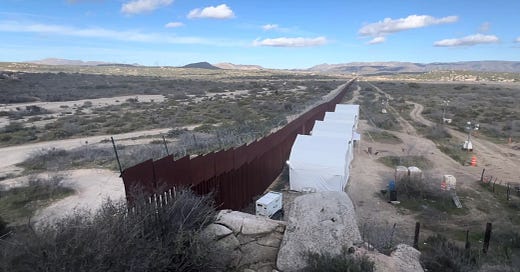Military Camp Reduces Migrant Flow by 90% in Jacumé
A summary of the main news from the U.S. - Mexico border
Military Camp Reduces Migrant Flow by 90% in Jacumé
Vicente Calderón, Tijuana Press.- A military camp established by Mexican authorities in Tecate, just east of Tijuana, has successfully reduced the irregular migrant flow through the area by 90%, according to David Pérez Tejada, delegate of the National Migration Institute. The camp, monitored by the Army, the National Migration Institute, and the National Guard, has helped control the route heavily used by asylum seekers trying to surrender to the U.S. Border Patrol. Despite the physical barriers posed by the region's rocky terrain, which previously allowed migrants to bypass rudimentary fences easily, the new measures have not stopped migration but redirected it to more dangerous areas. Critics, including Pedro Ríos from the American Friends Service Committee and former migration commissioner Tonatiuh Guillén, argue that these strategies risk migrant lives and inadvertently benefit human traffickers by pushing routes into perilous zones.
Maricopa County Faces $31M in Costs from Arpaio Profiling Verdict
Jacques Billeaud, Associated Press.- Maricopa County's expenses from a racial profiling verdict against former Sheriff Joe Arpaio have continued to climb, reaching a projected $314 million by mid-2025. This follows a federal judge's ruling nearly 11 years ago, which found that sheriff's deputies had racially profiled Hispanics during immigration-targeted traffic patrols under Arpaio's tenure. Despite ongoing efforts, the sheriff's office has yet to fully comply with the mandated overhauls, resulting in continued financial burdens for taxpayers. The substantial costs of compliance reforms have sparked debate in Arizona, influencing discussions about local police involvement in immigration enforcement and other justice department negotiations.
Senate Set for Second Vote on Border Bill, GOP Expected to Block Again
Luke Broadwater, New York Times.- Senate Majority Leader Chuck Schumer is set to push for a second vote on a bipartisan border bill previously blocked by Senate Republicans at the urging of Donald Trump. This bill, crucial for upcoming elections, aims to showcase Democratic efforts to control migration despite GOP opposition. Initially reaching a bipartisan compromise, the bill was designed to make asylum more difficult and increase deportations. However, it failed to achieve the necessary 60 votes, with Trump criticizing it as too lenient and rallying Republicans against it. Despite reduced crossings, public concern remains high. The upcoming vote seeks to highlight Republican resistance to border security solutions proposed by Democrats and supported by President Biden.
Migrantes en BC: Víctimas de Asesinatos y Explotación por Cárteles
Redacción Zeta.- Hao Zeng, un migrante de China Occidental, fue gravemente herido por criminales vinculados al Cártel de Sinaloa mientras intentaba cruzar la frontera en Tecate, Baja California. Su travesía, que comenzó en Ecuador y lo llevó a cruzar múltiples países, terminó trágicamente cuando fue baleado al intentar cruzar hacia Estados Unidos. Los cárteles controlan las rutas de migración en la región, exigiendo pagos exorbitantes y cometiendo actos violentos contra aquellos que no cumplen. Zeng sobrevivió después de ser abandonado y auxiliado por transeúntes. Este incidente subraya la peligrosidad extrema y el control de los cárteles sobre la migración en esta zona fronteriza, donde numerosos migrantes han sido asesinados o explotados en el último año.
Sentencian a Líder Vinculado al Cártel de Sinaloa a 10 Años en Arizona
Patricia Tamayo Meléndez, Semanario Zeta.- Luis Reinaldo Ramírez, líder de una organización criminal transnacional, fue sentenciado a 10 años de prisión en Mesa, Arizona, por su participación en actividades de lavado de dinero y extorsión en beneficio del Cártel de Sinaloa. Ramírez, quien administraba $16.5 millones provenientes del narcotráfico, utilizó empresas ficticias para lavar los ingresos ilícitos, facilitando operaciones en varias ciudades de Estados Unidos. La sentencia culmina tras una investigación de dos años por el FBI y la DEA, que incluyó la incautación de más de $1.3 millones en activos y la intercepción de drogas en Chicago. Su red fue desmantelada eficazmente, aunque algunos coacusados siguen prófugos en México. Este caso subraya la continua colaboración interagencial en la lucha contra el crimen organizado y el narcotráfico transnacional.
Extortion Hits Nuevo Laredo Construction Sector, Criminals Demand 20% of Goods Value
Mirna Ramos, El Norte.- In Nuevo Laredo, construction-related businesses are facing severe extortion by organized crime groups demanding 20% of the merchandise value transported. This recent uptick in criminal demands forces companies to increase consumer prices significantly and abruptly, which is challenging to justify and disrupt distributor operations. Extortion primarily affects the distribution of cement, steel, specialized lumber, and blocks. Companies unable to meet these demands risk criminals seizing their goods, vehicles, and even drivers. This has led to considerable discomfort and concern among distributors, who now must mark their shipments distinctly and report them to the criminals to avoid theft.





